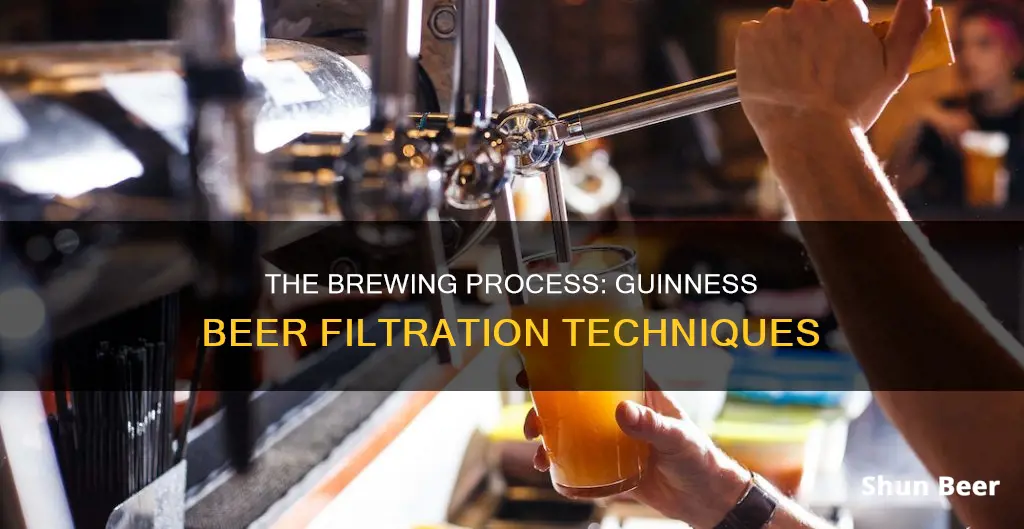
Guinness is a stout that originated in the brewery of Arthur Guinness at St. James's Gate, Dublin, Ireland, in the 18th century. It is one of the most successful alcohol brands worldwide, brewed in almost 50 countries, and available in over 120. Guinness uses a filtration method to remove yeast and other unwanted substances from its beer. The traditional method involved the use of isinglass, which is made from fish bladders. However, in recent years, Guinness has transitioned to vegan-friendly filtration methods to cater to the demands of vegan and vegetarian consumers. The new filtration process is likely a combination of adsorbent chemicals and physical filters, ensuring that the beer remains clear and flavourful while adhering to vegan standards.
| Characteristics | Values |
|---|---|
| Filtration Method | Cold filtration |
| Filtration Purpose | Remove yeast and other particles |
| Filter Type | Physical filter |
| Filter Material | Diatomaceous earth |
| Filter System | Adsorbent chemicals and physical filters |
| Filter Agent | Tannic acid |
| Filter Fining | Isinglass |
What You'll Learn

The use of isinglass (fish bladder) to filter Guinness
For years, Guinness used isinglass, a substance made from the dried swim bladders of fish, to filter its beer. The use of isinglass in the brewing process is a long-standing tradition, possibly dating back to the beer's 256-year history.
Isinglass is derived from the swim bladders of certain tropical and subtropical fish, such as sturgeon, and has been used for centuries as a fining or clarifying agent in alcoholic beverages. The word "isinglass" comes from the German and Dutch words for "sturgeon bladder." The swim bladder is sun-dried and then packed for export to be used in the brewing process.
When dissolved in dilute food-grade acids, the swim bladders form a turbid, colorless, viscous solution largely composed of the protein collagen. This solution is known as isinglass finings and is used by brewers to clarify and fine beer. The collagen in isinglass causes yeast to precipitate out of suspension, leaving the beer clear.
The use of isinglass in the Guinness brewing process was recently discontinued due to pressure from consumers, particularly the vegetarian and vegan communities. Guinness has since announced that it will build a new filtration system to replace the use of isinglass and make its beer vegan-friendly.
Guinness: A Beer or Not?
You may want to see also

Guinness's new filtration system to replace isinglass
In 2015, Guinness announced that it would be implementing a new filtration system to replace isinglass in its manufacturing process, making its beer vegan-friendly. The change came after 256 years of using isinglass, a collagen product made from fish bladders, to remove extra yeast and clarify its beer. The new filtration system was expected to be installed in 2016, with Guinness confirming that all kegs of Guinness on the market were vegan-friendly as they had been made using the new process.
The decision to remove isinglass from the filtration process was driven by consumer demand, with vegans and strict vegetarians calling for Guinness to find an alternative. Isinglass is a gelatin-like substance that helps to speed up the settling of yeast and can make the beer look cloudy. While it doesn't affect the flavour, it can leave trace amounts in the beer, making it unsuitable for vegans and strict vegetarians.
Guinness's new filtration system is described as "state-of-the-art" but the company has not disclosed the specific details of the new process. It is likely that they are using alternative fining agents or a combination of chemical and physical filters like silica, diatomaceous earth, or tannic acid. These methods are commonly used in the beer industry to clarify beer without affecting its taste or chemistry.
The removal of isinglass from the filtration process did not change the recipe or taste of Guinness, according to a spokesperson for the company. In 2018, Guinness confirmed that all of its products worldwide, including Guinness Draught, Guinness Extra Stout, and Guinness Foreign Extra Stout, are now isinglass-free and suitable for vegans. The company's alcohol-free beer, Guinness 0.0, is also vegan-friendly.
Guinness Beer: High-Fructose Corn Syrup Content Explored
You may want to see also

The use of adsorbent chemicals and physical filters
Diatomaceous earth is a very effective filtration system for removing sticky substances like yeast from the brew. However, it has some drawbacks. It is expensive to purchase and dispose of, and it cannot be reused.
Guinness has likely adopted this common method of filtration to replace their previous use of isinglass, a product made from dried fish bladders, in their 256-year-old Irish stout. In 2015, the company announced that it would be investing in a new filtration system to replace isinglass, following pressure from vegan and vegetarian consumers.
The new filtration system would need to be as effective as isinglass without changing the clarity of the beer, a challenge according to Karl Siebert, a professor of biochemistry in the food sciences department at Cornell University. Guinness's new filtration method was first rolled out for draught Guinness in kegs, with the company announcing that all Guinness Draught produced and served worldwide is now brewed without using isinglass.
Guinness Beer: Carcinogen Concerns and Consumption
You may want to see also

The process of cold filtration
After the alcohol is removed, the brewers carefully blend and balance the flavours to ensure the distinctive flavour profile and taste characteristics of Guinness are maintained. The resulting product is a stout that is unmistakably Guinness, just without the alcohol. It features the same dark, ruby red liquid and creamy head, with hints of chocolate and coffee, smoothly balanced with bitter, sweet and roasted notes.
In addition to creating Guinness 0.0, the cold filtration process can also be used to make non-alcoholic versions of other beers. This process ensures that the flavour and character of the original beer are preserved, even without the alcohol. By using cold filtration, brewers can offer non-alcoholic options that closely resemble the taste and experience of their traditional beers.
Guinness: Exploring the Dark Beer Connoisseur's Favorite Brew
You may want to see also

The history of Guinness filtration
For much of its history, Guinness filtration involved the use of isinglass, a gelatinous substance derived from fish bladders, which helped dissolve gelatinous substances and remove excess yeast particles, resulting in a clear, flavourful beer. This practice was common in the beer industry, with some American craft brewers still using isinglass in their cask-conditioned beers and lagers.
However, in recent decades, there has been a shift away from using isinglass due to advances in centrifugation and filtration technology. Guinness led the way in this transition, becoming one of the first major beer brands to adopt modern filtration systems. In 2017, Guinness made the switch to a new filtration process, discontinuing the use of isinglass and making its iconic draught beer suitable for vegans.
The change in filtration method also had an impact on the taste and texture of Guinness. The new filtration process, combined with the use of nitrogen instead of carbon dioxide, resulted in smaller bubbles, giving the beer a smoother, creamier mouthfeel and a subtle fizz. This change contributed to the unique character of Guinness, setting it apart from other beers in the market.
Today, Guinness continues to be a pioneer in the beer industry, constantly innovating and refining its brewing processes to maintain its position as one of the world's most iconic beer brands.
Guinness Beer: Does It Contain Fish?
You may want to see also
Frequently asked questions
Filtering Guinness beer removes yeast and other substances left over from the brewing process, giving the beer a clearer appearance.
Guinness beer is filtered using a combination of adsorbent chemicals and physical filters. Adsorbent agents, such as silica or PVPP, are added to the brew, causing clouding proteins and yeast to stick to them. The beer is then run through a physical filter, such as diatomaceous earth, to remove these particles.
Historically, Guinness used isinglass, a substance made from dried fish bladders, as a fining agent to speed up the settling of yeast and other particles.
In 2016, Guinness stopped using isinglass and adopted a new filtration system to make its beer vegan-friendly. Isinglass is an animal product, and vegans and vegetarians had long petitioned the company to find an alternative.
Yes, as of 2016, all Guinness beer, including kegs, cans, and bottles, is vegan-friendly and does not contain any animal products.







